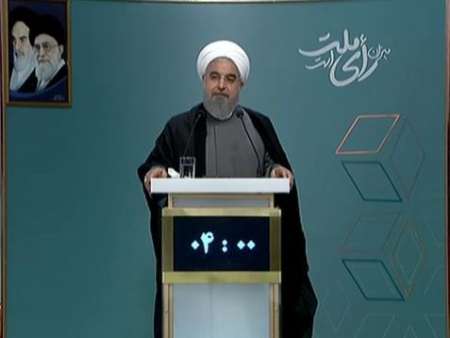

Presidential hopeful Hassan Rouhani says Iran alongside with Russia and Turkey plays a major role in the Astana talks aimed at addressing the crisis in Syria and this shows the power of Iranian diplomacy.
President Rouhani made the remarks during the second group debate of presidential candidates, aired on the state television Friday evening with political and cultural issues in the spotlight.
Rouhani referred to the efforts made by the nuclear negotiators during talks with the G5+1 group of nations and noted that all nuclear-related sanctions have been lifted.
He pointed to increase of oil export to 2 million bpd after the nuclear deal, known also as the Joint Comprehensive Plan of Action (JCPOA) and noted that without the nuclear deal, the Islamic Republic oil export would have been just 200,000 bpd.
“Thanks to the nuclear deal, we have not only removed sanctions but also we have made progress in nuclear technology,” he said.
The presidential candidate said that Iran’s heavy water nuclear reactor in the city of Arak is expected to be redesigned by using most advanced and modern technologies.
President Rouhani also called closure of Possible Military Dimension(PMD) of Iran’s peaceful nuclear program and the ongoing Syria talks in the Kazakhstan capital, two of its government achievements in the field of diplomacy.
He went on to refer to the adoption of the citizenship rights charter by his government and urged all to follow the rules in this regard.
All sects and minority groups should enjoy equal rights according to the law, Rouhani noted.
Two weeks before Iran’s 12th presidential elections, the second live debate of presidential candidates, started here on Friday afternoon with political and cultural issues in the spotlight.
The first debate focusing on social affairs was held live on state TV on April 28.
Ebrahim Raeisi, the custodian of Imam Reza (AS) holy shrine, Vice-President Eshaq Jahangiri, Tehran Mayor Mohammad Baqer Qalibaf, former minister of culture and Islamic guidance Mostafa Mirsalim and former vice president Mostafa Hashemi Taba, as well as President Hassan Rouhani are the six candidates to compete in May 19 presidential elections.
The candidates are given equal times so that they can introduce their plans in both live and recorded television and radio programs to the nation, based on a specific time-table which has been announced earlier.
Documentaries about each candidate’s biography have also been produced by their electoral headquarters to be aired twice on state television to let those eligible to vote get more familiar with the candidates.
Social networks seem to have a significant role in the elections this year as the supporters of each candidate have an active presence in cyberspace.
After 1979 Islamic Revolution which led to the fall of the Pahlavi regime, Iran has held one election each year on average all of which have witnessed large turnouts of the people.







